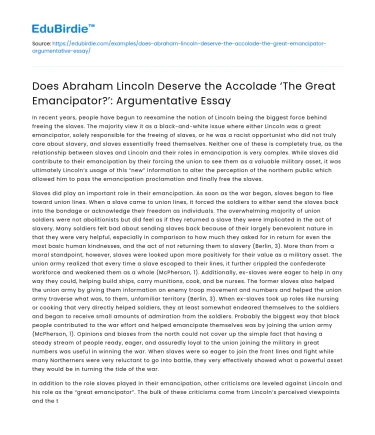In recent years, people have begun to reexamine the notion of Lincoln being the biggest force behind freeing the slaves. The majority view it as a black-and-white issue where either Lincoln was a great emancipator, solely responsible for the freeing of slaves, or he was a racist opportunist who did not truly care about slavery, and slaves essentially freed themselves. Neither one of these is completely true, as the relationship between slaves and Lincoln and their roles in emancipation is very complex. While slaves did contribute to their emancipation by their forcing the union to see them as a valuable military asset, it was ultimately Lincoln’s usage of this “new” information to alter the perception of the northern public which allowed him to pass the emancipation proclamation and finally free the slaves.
Slaves did play an important role in their emancipation. As soon as the war began, slaves began to flee toward union lines. When a slave came to union lines, it forced the soldiers to either send the slaves back into the bondage or acknowledge their freedom as individuals. The overwhelming majority of union soldiers were not abolitionists but did feel as if they returned a slave they were implicated in the act of slavery. Many soldiers felt bad about sending slaves back because of their largely benevolent nature in that they were very helpful, especially in comparison to how much they asked for in return for even the most basic human kindnesses, and the act of not returning them to slavery (Berlin, 3). More than from a moral standpoint, however, slaves were looked upon more positively for their value as a military asset. The union army realized that every time a slave escaped to their lines, it further crippled the confederate workforce and weakened them as a whole (McPherson, 1). Additionally, ex-slaves were eager to help in any way they could, helping build ships, carry munitions, cook, and be nurses. The former slaves also helped the union army by giving them information on enemy troop movement and numbers and helped the union army traverse what was, to them, unfamiliar territory (Berlin, 3). When ex-slaves took up roles like nursing or cooking that very directly helped soldiers, they at least somewhat endeared themselves to the soldiers and began to receive small amounts of admiration from the soldiers. Probably the biggest way that black people contributed to the war effort and helped emancipate themselves was by joining the union army (McPherson, 1). Opinions and biases from the north could not cover up the simple fact that having a steady stream of people ready, eager, and assuredly loyal to the union joining the military in great numbers was useful in winning the war. When slaves were so eager to join the front lines and fight while many Northerners were very reluctant to go into battle, they very effectively showed what a powerful asset they would be in turning the tide of the war.
Save your time!
We can take care of your essay
- Proper editing and formatting
- Free revision, title page, and bibliography
- Flexible prices and money-back guarantee
In addition to the role slaves played in their emancipation, other criticisms are leveled against Lincoln and his role as the “great emancipator”. The bulk of these criticisms come from Lincoln’s perceived viewpoints and the things he had said. Lincoln did not run on an abolitionist platform, only as anti-slavery, which was the attitude of the vast majority of the North who only objected to the expansion of slavery because of what it could do to them financially and not for some altruistic moral reason. Once he was elected, he reassured the South that he would not and could not affect slavery where it was already in place (McPherson, 2). After the war had begun, Lincoln continually reaffirmed that he was more committed to the preservation of the union than the demise of slavery (McPherson, 1). More than his lack of action or seeming indifference, his views on how emancipation should be handled are often seen as more problematic. Lincoln had spoken about he was in favor of slowly releasing slaves and then compensating the slave owners for their lost “property” (Berlin, 3). Even more troubling than the gradual release and compensation were his view on a biracial society. Lincoln that the two races could not harmoniously coexist in the same place, and to solve this problem, Lincoln ascribed to the idea of “colonization” (Foner,1, Oates, 7/369). In this context, colonization refers to the idea of sending newly emancipated Americans and sending them to Africa for them to start their own country and society. It was not just his opinions or words that have been called into question, but his actions as well. Lincoln was very slow to act after the war had started, and only saw emancipation as a last resort (Oates, 14/376).






 Stuck on your essay?
Stuck on your essay?

